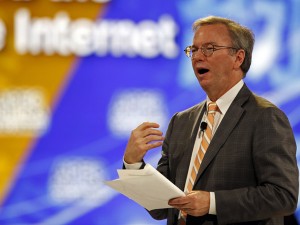12:50 pm | Sunday, November 13th, 2011
HONOLULU – Broader adoption of the Internet will keep governments on
their toes as wired-up citizens exercise their new found power to check
rights abuses, Google chief Eric Schmidt said on Saturday.
“In nations and communities around the world, citizens are turning to
online tools to keep their governments honest,” he told business
leaders on the sidelines of the Asia-Pacific Economic Cooperation (APEC)
forum in Honolulu.
“Whistleblowing has never been so easy,” he said.
Schmidt cited demonstrations that toppled the leaders of Tunisia and Egypt in which activists used Facebook to schedule protests, Twitter to coordinate them and YouTube to broadcast the events to the world.
“Online citizens can find like-minded allies, they can find like-minded diasporas from a country,” he said.
With 52 percent of the global population under the age of 30, the youth can have a bigger say on issues because they are the most prolific users of the Internet.
“They are the ones who are online, that’s how you reach them, that’s how they talk to each other. They share applications and proxy and circumvention tools and help magnify each others’ causes,” he said.
But while governments should not ignore online protests, Schmidt also warned that they could be exaggerated.
“It’s easy in the online world to create the impression of a revolution in the form of noise. It’s important to understand what is a legitimate protest and whether it’s just people trying to create some noise… some excitement.”
Greater adoption of the Internet will lead to the creation of two global systems – the physical sphere where the government has power over its people and a virtual world where people can have more influence, he said.
And there’s little place to hide for those who do bad.
Atrocities against citizens can be documented more easily and “we can start trials against evil-doers before (their acts are) even stopped,” he said.
“There are no caves online.”
With only an estimated two billion of the global population of seven billion online, there is still room for expansion, Schmidt said.
http://bit.ly/tHd02z
 |
| Eric
Schmidt, executive chairman of Google, speaks to delegates of the Asia-Pacific Economic Cooperation (APEC) summit Saturday, November 12, 2011, in Honolulu. ANDRES LEIGHTON/AP PHOTO |
“Whistleblowing has never been so easy,” he said.
Schmidt cited demonstrations that toppled the leaders of Tunisia and Egypt in which activists used Facebook to schedule protests, Twitter to coordinate them and YouTube to broadcast the events to the world.
“Online citizens can find like-minded allies, they can find like-minded diasporas from a country,” he said.
With 52 percent of the global population under the age of 30, the youth can have a bigger say on issues because they are the most prolific users of the Internet.
“They are the ones who are online, that’s how you reach them, that’s how they talk to each other. They share applications and proxy and circumvention tools and help magnify each others’ causes,” he said.
But while governments should not ignore online protests, Schmidt also warned that they could be exaggerated.
“It’s easy in the online world to create the impression of a revolution in the form of noise. It’s important to understand what is a legitimate protest and whether it’s just people trying to create some noise… some excitement.”
Greater adoption of the Internet will lead to the creation of two global systems – the physical sphere where the government has power over its people and a virtual world where people can have more influence, he said.
And there’s little place to hide for those who do bad.
Atrocities against citizens can be documented more easily and “we can start trials against evil-doers before (their acts are) even stopped,” he said.
“There are no caves online.”
With only an estimated two billion of the global population of seven billion online, there is still room for expansion, Schmidt said.
http://bit.ly/tHd02z
No comments:
Post a Comment